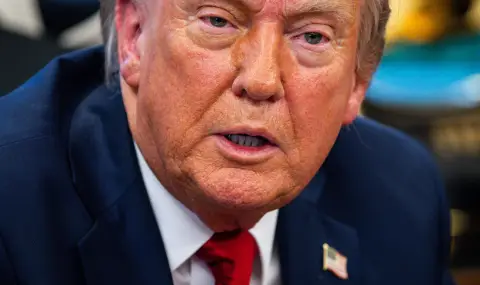New tariffs on imports from China could be announced in "two or three weeks" amid the ongoing trade dispute between the world's two largest economies. This was stated by US President Donald Trump, quoted by DPA. BTA reported.
"If we don't have a deal with a company or a country, we will determine the tariffs. We're just going to set the tariffs," Trump said in the Oval Office.
"That's something that we think will happen, I would say in the next couple of weeks...I think in the next two to three weeks we'll set the number and we'll (set a tariff), maybe on China as well," Trump said.
In response to a reporter's question about whether the United States and China were holding direct talks, Trump said "yes, of course, every day", and when asked how soon he intended to reduce tariffs on Chinese imports into the United States, Trump replied that "that's up to them".
In early April, Trump announced that the United States was imposing general tariffs of at least 10 percent on all imports into the U.S. market, and higher rates on a number of trading partners, which caused significant turmoil in stock and financial markets.
Although many of the planned tariffs were frozen for 90 days to allow for trade talks, tariffs of up to 145 percent remain in place on Chinese goods. Beijing retaliated with tariffs of up to 125 percent on American products.
Trump also said that the 25 percent tariff on Canadian car imports could go up.
"When I put tariffs on Canada - they pay 25 percent - but it could go up on cars," Trump said. "All we're doing is saying, "We don't want your cars, with all due respect. "We want to actually make our own cars," the president added.
At the same time, 12 US states have filed a lawsuit against Trump's tariff policy in the US Court of International Trade, which is based in New York.
The lawsuit claims that US trade policy "now depends on the whims of the president, rather than the prudent exercise of his lawful powers."
The plaintiffs argue that under the US Constitution, only Congress has the right to impose taxes, tariffs and duties, not the president.
The lawsuit was filed by the states of Oregon, Colorado, Connecticut, Delaware, Illinois, Maine, Minnesota, New Mexico, New York and Vermont, whose governors are Democrats, as well as the states of Arizona and Nevada, which are led by Republicans.
The plaintiffs are asking the court to overturn the tariffs on the grounds that "The president has no right to impose tariffs arbitrarily".
Last week, the state of California filed a separate lawsuit against Trump's tariffs in federal court.
According to the International Monetary Fund, the large-scale US tariffs and the retaliatory measures announced by its trading partners are leading to a sharp increase in global public debt, with the US economy also suffering from the tariff policy.
